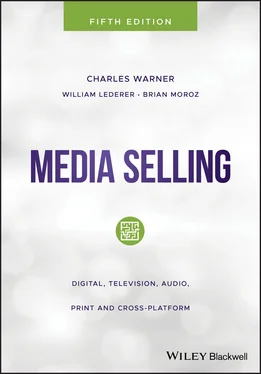Underpromise. It is salespeople’s responsibility not to promise what advertising by itself cannot deliver. The media can deliver exposure to an audience. But the media cannot be certain of generating sales results, so it should not promise results to advertisers. Rather, salespeople should promise only what they can deliver. The rule to remember is “underpromise and overdeliver.”
4. Responsibility to the community
The word community has many meanings, but in this context, it is limited to four: (1) the global community, (2) the general business community, (3) an industry community, and (4) a local community.
The global community. Each corporation and individual ultimately has a responsibility to the world community. We owe it to society to act in a way that provides the greatest good for the greatest number of people, that enhances the environment, that improves the human experience and condition, and that, in the words of the Hippocratic oath, does no harm. To answer questions about our social responsibility, we should always ask ourselves the question, “Suppose everybody did this?” 13
The business community. As members of the free‐market business community salespeople must behave responsibly so that investors, regulators, and the general public have faith in our capitalistic system. All companies have, or should have, published rules, codes, or standards that prohibit unethical behavior such as selling stock based on inside knowledge, shredding documents or deleting computer files to avoid prosecution, cooking the books to inflate revenue, and avoiding sexual harassment. In business, as well as in society, salespeople must ask: “Suppose everybody did this? Would the regulators, investors, and the public maintain their faith in the free‐market system and in business?”
An industry community. The media have a special responsibility to the public because in many cases the media deliver the news to Americans. The public also forms many of their social values, beliefs, attitudes, and opinions from the digital, social, electronic, and print media. This enormous power makes it more imperative that the media wield that power responsibly. As a country, we altered our aggregate opinions about racial prejudice, about the war in Iraq, and about women’s rights while we watched images of these issues mesmerize, indoctrinate, and change us. The advertising messages between these images guaranteed the freedom of the press that bigots, the government, and non‐egalitarian people might not want us to have. If any one of these groups had controlled the media, we might not have been exposed to these issues and the truth would not have worked its torturous way into our collective consciousness. Therefore, media companies and their salespeople have the responsibility of keeping the media and the press free by fueling it with the advertising revenue it needs to remain so. Without a free, advertising‐ or subscriber‐supported media, there cannot be a free exchange of ideas. This exchange of ideas leads to an informed electorate, the foundation of our democracy. As a salesperson, you might say, “The high‐minded notion of protecting democracy is fine if you’re selling “60 Minutes” or CNN or the Washington Post, but I’m selling commercials on a Rock ‘N Roll radio station.” But no one program, no one news story, or no one medium is necessarily more important than another, rather it is the free‐market, advertising‐supported system that is important. By selling within that free‐market system, media salespeople are sustaining a market for advertising that supports all information and entertainment content. Salespeople must be ethical and play by the rules not only because public attention is focused on corporate ethics, but also because attention is intensely focused on the media. The believability of the media in general and journalism specifically has been eroding in recent years, and advertising has never been at the top of the list in the public’s esteem. Thus, the media must attempt to turn around the image, esteem, and credibility of its product (information, entertainment, and opinion) and its supporting buttress, advertising, if the media hope to thrive. 14
A local community. All companies, organizations, and people have a responsibility as citizens to act responsibly and ethically towards their neighbors in the community where they live and work. The simple rule is, “Don’t foul your own nest. Don’t cheat your neighbor.” The local media must first serve their communities, for without local support, local media cannot thrive or even exist. Remember that broadcast media are given licenses based on their promise to serve their communities, so their obligation is not only a moral, social one, but also a regulatory one.
5. Responsibility to a company
Media salespeople represent their companies to their customers and because they are selling an intangible product, they become the personification of, the surrogate for, their product. Salespeople are often the only contact a customer will have with anyone from a company. Therefore, they have to face the kill‐the‐messenger attitude many people have about the media. Because of this unique situation, a company’s credibility depends on its salespeople’s credibility, which to a large degree depends on their personal conduct and integrity. Salespeople must be law abiding, respectful of civil liberties and actions or statements that are potentially offensive to others, as well as be moderated in their personal habits. It is the responsibility of salespeople to build and maintain customer relationships based on dependability, reliability, believability, integrity, and ethical behavior.
Salespeople must give their job their full attention, not steal company’s assets, not waste its resources (which includes efficient and reasonable use of entertainment and transportation money), not file false expense reports, and not offer special deals to get business away from others within their own organization.
Salespeople have a responsibility to their company to generate revenue by getting results for clients, to sell special promotions and packages, and to keep customers and get renewals. There are times when the responsibility to a company to generate revenue can come into conflict with a salesperson’s duty to his or her customers, to his or her conscience, and to the various communities. When such conflicts occur, salespeople should remember the hierarchy of responsibilities and that their company is at the bottom of that hierarchy, because it is in the company’s best long‐term interest to be last. Good companies know that what goes around, comes around; that good karma returns home; that ethical behavior is good business; that employees are happier working for ethical companies; and that consumers keep coming back to products and companies they believe are ethical, do the right thing, and are sustainable.
Great media companies understand that, if they take care of their audience that usage, readership, and ratings will go up, which means advertising revenue will go up. Also, if advertisers trust salespeople and their companies, most advertisers will pay higher prices for better service from these trusted partners. If salespeople do the wrong thing, it results in lost customers, expensive employee turnover, high lawyers’ fees, large court costs, and, perhaps, even time in jail.
Unfortunately, many companies set up rewards for salespeople that unwittingly reinforce doing the wrong thing. These include compensation systems that reward getting an order regardless of what’s best for the customer, contests that reward selling special promotions or events regardless of advertisers’ needs, and bonuses for making sales budgets regardless of what is reasonable. 15 Beware of chief finance officers (CFOs) and top management that recommend accounting practices that “preserve a company’s assets”; they often have the wrong assets in mind. A company’s and a salesperson’s most precious asset is an excellent reputation, which is preserved by always doing the right thing all of the time.
Читать дальше












